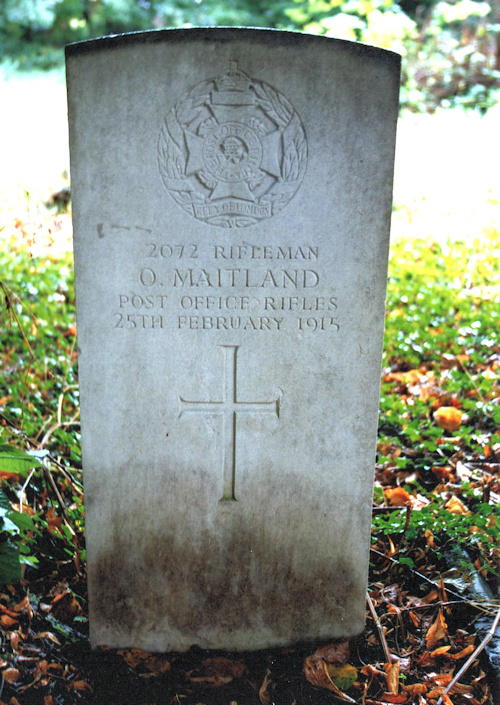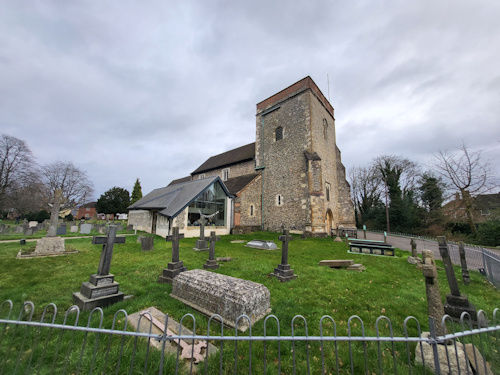Name
Oliver Maitland
Conflict
First World War
Date of Death / Age
25/02/1915
36
Rank, Service Number & Service Details
Rifleman
2072
London Regiment (Post Office Rifles) *2
8th (City of London) Bn.
Awards: Service Medals/Honour Awards
Not Yet Researched
Cemetery/Memorial: Name/Reference/Country
ABBOTS LANGLEY (ST. LAWRENCE) CHURCHYARD
351 (N.E. Plot).
United Kingdom
Headstone Inscription
Not Researched
UK & Other Memorials
Abbots Langley Village Memorial(*1)
Biography
Oliver Maitland enlisted at Hampstead and had spent under six months with the Post Office Rifles, when he tragically died of pneumonia at Watford Hospital in February 1915. He had been born in the summer of 1878 at Ryde on the Isle of Wight, the son of a Coachman. On 2nd April 1900 he married Alice May Wheeler at Ryde, and the couple went on to have five children. By 1908 the family had moved to 2 Belsize Park Mews in Hampstead and Oliver began working as a Postman.
The 8th London Regiment (Post Office Rifles) was a Territorial Unit, made up mainly of Postmen. It was mobilised in August 1914 at Bunhill Row, near Old Street, and moved to Abbots Langley in early November to replace the 13th London Regiment (The Kensingtons), which had left to go to France. The Post Office Rifles were billeted in the village and at the Leavesden Asylum, and spent the winter months training. It is possible that Maitland was taken ill during one of the Battalion’s route marches through the local countryside, and subsequently died in hospital at Watford some days later.
He was buried in St Lawrence Churchyard following a Military Funeral. The event was reported in the Watford Observer (6th March 1915), where he was erroneously referred to as Rifleman C Maitland.
“Abbots Langley Military Funeral
The funeral of Rifleman C. Maitland, B Coy, Post Office Rifles, took place at Abbots Langley Church with full military honours on Monday last. He died of pneumonia in Watford Hospital on Feb 25th.
The gun carriage and firing party left the hospital about one o’clock and proceeded along Merton and Cassio Roads into St Albans Road, and by way of Garston to Abbots Langley Church. They were met at Leavesden by the band and men of B Coy., under the command of Major Hood, in place of the Colonel, who was away, and other officers. Handel’s Dead March in Saul, and Beethoven’s Funeral March, were played on the way to the Church.
The Vicar of Abbots Langley, accompanied by the Regimental Chaplain and Choir, met the remains at the Church, which was filled with soldiers. Appropriate music was played on the organ as the cortege entered the church. Psalm XXXIX was then sung by the choir, and the lesson was read by the chaplain. The hymn “Jesu Lover of my Soul” concluded the service in the church, and as the bearers carried the coffin to the grave, Chopin’s Funeral March was played by the organist (Mr W.H. Rendle). Three volleys were fired over the grave by the firing party, and the “Last Post” was sounded by the buglers.
The deceased was a postman in the West Hampstead district, London, and a number of his postmen comrades were present. He leaves a widow and five children”.
Additional Information
*1 Added to memorial in 2019.
*2More correctly (City of London) Bn. London Regiment (Post Office Rifles).
Acknowledgments
Roger Yapp - www.backtothefront.org



